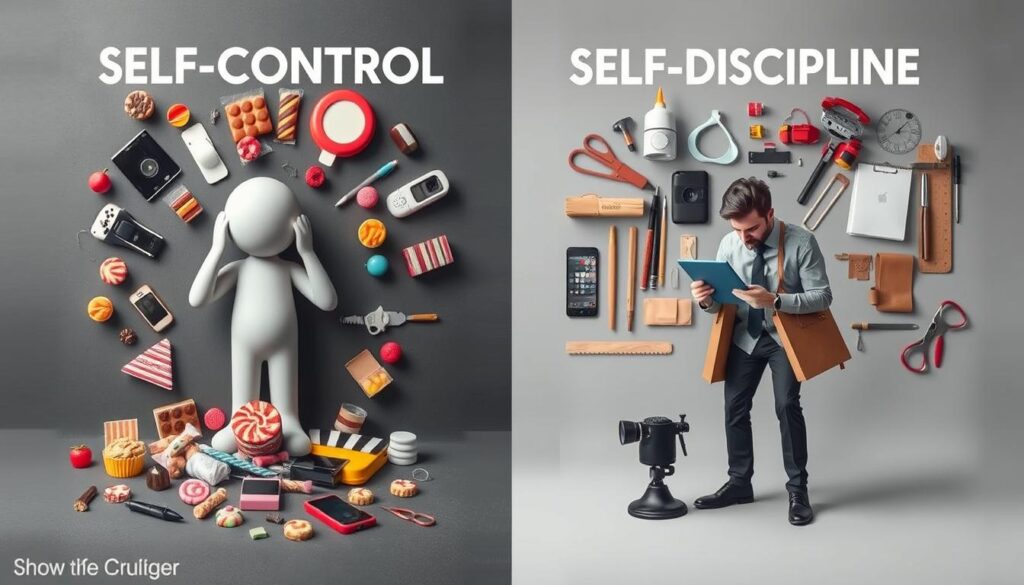“Self-discipline is the ability to do what is right when it would be easier to do what is wrong.” – Napoleon Hill, renowned author and motivational speaker.
This quote from Napoleon Hill highlights the importance of self-discipline. It shows how crucial it is in our lives. In today’s world, where quick fixes are common, self-control is a rare and precious skill. This article will show that self-discipline is not just a luxury but a must for reaching our highest goals.
Table of Contents
Understanding Self-Discipline as a Fundamental Value
Self-discipline is more than a good trait; it’s a key value that shapes our daily life and future success. It lets us control our impulses, emotions, and actions to reach our goals. This is the foundation of personal growth and success.
The Psychology Behind Self-Disciplined Behavior
Self-discipline is linked to willpower and self-control. People with strong self-discipline can delay gratification and resist temptations. They make choices that match their values and goals, not just their immediate wants.
How Values Shape Our Daily Choices
Our personal values guide our daily decisions and actions. When self-discipline is a core value, we tend to choose actions that support our long-term goals. This is how self-disciplined people make decisions.
The Connection Between Values and Habits
Self-discipline helps form lasting habits. By living in line with our values, we create routines that strengthen self-discipline. This cycle of value-driven choices and habits drives personal growth and success.
| Characteristic | Self-Disciplined Individuals | Individuals Lacking Self-Discipline |
|---|---|---|
| Impulse Control | High | Low |
| Delayed Gratification | Practiced | Difficulty |
| Goal-Oriented Behavior | Consistent | Inconsistent |
| Habit Formation | Effective | Challenging |
“Self-discipline is the ability to do what you should do, when you should do it, whether you feel like it or not.”
Is Self-Discipline A Personal Value: Exploring the Core Question
Self-discipline is key to personal growth and success. But is it a personal value or just a tool? We’ll dive into this question in this section.
Many see self-discipline as essential for reaching goals and a fulfilling life. It helps control thoughts, emotions, and actions for long-term goals. Yet, the link between self-discipline and personal values is complex.
To see if self-discipline is a personal value, we must look at its alignment with other core values. Self-discipline helps achieve values like productivity and goal-setting, but is it a value itself? The real question is if self-discipline is valuable in itself or just a means to other goals.
“Self-discipline is the ability to do what you should do, when you should do it, whether you feel like it or not.” – Elbert Hubbard
Self-discipline also depends on upbringing, culture, and personal experiences. Some see it as a core part of their character. Others view it as a hard but necessary step towards self-improvement.
Whether self-discipline is a personal value is a personal matter. There’s no one-size-fits-all answer. By exploring this, we can understand how self-discipline influences our priorities and well-being.
The Impact of Self-Discipline on Personal Growth
Self-discipline is a powerful tool for personal growth. It helps build mental strength, overcome inner doubts, and create lasting habits. These habits support your success over time.
Building Mental Fortitude Through Practice
Practicing self-discipline is like training your mind. With regular effort, you grow mentally strong. This strength helps you face tough tasks, stay focused, and keep going even when things get hard.
Overcoming Internal Resistance
Internal resistance is a big obstacle to growth. Self-doubt, fear, and lack of motivation can stop us. Self-discipline helps you recognize and beat these barriers. This empowers you to move forward towards your goals.
Developing Sustainable Habits
Real growth comes from lasting habits. Self-disciplined people create routines that help them stay well in the long run. These habits can be anything from regular exercise to learning new skills. Self-discipline makes your dreams a reality.
| Trait | Description | Impact on Personal Growth |
|---|---|---|
| Mental Fortitude | The ability to persevere through challenges and maintain focus in the face of adversity. | Enhances resilience, problem-solving skills, and the capacity to overcome obstacles. |
| Overcoming Internal Resistance | The skill to recognize and confront self-limiting beliefs, fears, and a lack of motivation. | Empowers individuals to take meaningful action towards their goals and personal development. |
| Sustainable Habits | The creation of consistent routines and practices that support long-term well-being and growth. | Fosters the development of healthy behaviors and a lifestyle aligned with personal values and aspirations. |
Embracing self-discipline unlocks your full growth potential. It builds mental strength, helps overcome inner doubts, and creates lasting habits. These habits are key to lasting success.
“Self-discipline is the foundation upon which all success is built. Without it, you are nothing.”
Self-Control vs. Self-Discipline: Understanding the Difference
Self-control and self-discipline are often mixed up, but they’re not the same. Self-control is about managing your impulses and emotions. It helps you resist temptation and make choices that align with your goals. Self-discipline is about the willpower to keep working towards your goals, even when it’s hard.
Think of self-control as saying “no” to quick pleasures. Self-discipline is about saying “yes” to hard work and rewards that come later. Both are key for growing and achieving, but knowing the difference helps you improve better.
| Characteristic | Self-Control | Self-Discipline |
|---|---|---|
| Focus | Resisting temptation and impulses | Consistently taking action towards goals |
| Mindset | Restraint and immediate self-denial | Perseverance and delayed gratification |
| Application | Stopping yourself from engaging in unhealthy behaviors | Committing to a regular exercise routine or study schedule |
| Outcome | Avoiding negative consequences in the short-term | Achieving long-term personal and professional objectives |
Knowing the difference between self-control and self-discipline helps you grow better. Finding a balance between these skills makes you more focused and determined. It helps you face life’s challenges with strength and resilience.

How Self-Discipline Shapes Character Development
Self-discipline is more than just willpower or changing behaviors. It’s key to character development. By practicing self-discipline, people build a stronger sense of purpose and integrity. This shapes their character and personal growth.
The Role of Willpower in Character Building
Willpower is at the core of self-discipline. It helps resist temptations and stay focused on goals. Regular use of willpower strengthens self-control, boosting character development.
As willpower grows, people make choices that reflect their values and goals.
Creating Long-lasting Behavioral Changes
Self-discipline is about lasting changes, not quick fixes. It helps break bad habits and build new, persistence-driven routines. This leads to behavioral changes that support personal growth and well-being.
“The ultimate measure of a man is not where he stands in moments of comfort and convenience, but where he stands at times of challenge and controversy.” – Martin Luther King Jr.
Embracing self-discipline builds a stronger, more resilient character. It helps people grow and develop over time. As they improve their willpower and make behavioral changes, they open up new paths for personal growth and character development.
Cultivating Self-Discipline in Daily Life
Building self-discipline is a journey, not a quick fix. It takes effort and dedication every day. Here are some ways to make daily self-discipline a part of your life:
- Start your day with self-regulation and focus. Begin with a habit like meditation or journaling.
- Make a daily schedule and stick to it. Set time for work, study, exercise, and fun to keep things structured.
- Divide big goals into smaller steps. Achieving these small goals can motivate you to keep going.
- Get rid of distractions and create a quiet space. Avoid social media, TV, and other time-wasters.
- Always celebrate your wins, no matter how small. This helps you see the good in your self-discipline efforts.
By using these daily self-discipline tips, you can improve your self-regulation and focus. This will help you reach your personal and work goals.
The Relationship Between Self-Discipline and Success
Self-discipline is a key trait that greatly affects success in life. It helps in career growth and reaching personal goals. It’s the foundation for reaching one’s highest potential.
Career Achievement Through Disciplined Approaches
Those with high self-discipline do well in their careers. They manage their time well, stay focused, and get things done. This leads to career success and recognition.
A study by the University of Pennsylvania showed a big difference. Self-disciplined workers got 40% more promotions in two years. This shows how self-discipline boosts career growth and career achievement.
Personal Goal Attainment
Self-discipline is also key for personal goals. It helps in getting healthier, learning new things, or saving for big dreams. Self-discipline turns dreams into reality.
Angela Duckworth’s work on grit and determination shows self-discipline’s importance. People with self-discipline keep going, overcome hurdles, and achieve their goals.
| Trait | Impact on Success |
|---|---|
| Self-Discipline |
|
The facts are clear: self-discipline is crucial for success. It’s important in work and personal life. By developing this trait, people can open doors to new opportunities and reach their highest potential.
Breaking Down the Components of Self-Discipline
Self-discipline is made up of several important parts. To really get it, we need to look at self-regulation, focus, and grit. These are the main parts of self-discipline.
Self-Regulation: At the core of self-discipline is controlling your emotions, thoughts, and actions. It means you can wait for what you want, say no to temptations, and keep your eyes on the future. People who are good at self-regulation can handle tough times and stick to what they believe in.
Focus: Being able to stay focused is also key. It helps you stay on track, ignore distractions, and keep going even when it’s hard. Having sharp focus is crucial for reaching your goals and making steady progress.
Grit: Grit is about keeping going towards your goals, even when things get tough. It’s about being dedicated and willing to work hard to overcome obstacles. Gritty people are committed to their goals and put in the effort needed to succeed.
By understanding and working on these components of self-discipline, we can tap into its power. This helps us grow and reach our highest potential.

“Discipline is the bridge between goals and accomplishment.” – Jim Rohn
Strategies for Strengthening Your Self-Discipline
Building strong self-discipline is key for personal growth and reaching your goals. By using effective strategies, you can develop this important trait. This section will show you how to strengthen your self-discipline and build lasting habits.
Creating Effective Routines
Creating consistent effective routines is a base of self-discipline. A daily schedule helps your mind stay focused and disciplined. Identify your best work hours and plan your day accordingly.
As you stick to these routines, they become natural. This helps you manage your time and energy better.
Setting Progressive Challenges
Setting progressive challenges is a great way to grow your self-discipline and resilience. Start with small, reachable goals and make them harder as you get more confident. This way, you feel accomplished and ready for bigger tasks.
Remember, being consistent and persistent is crucial for building self-discipline.
“Developing self-discipline is a journey, not a destination. Embrace the process and celebrate your progress along the way.”
By using these strategies, you can boost your self-discipline and create effective routines. You’ll also set progressive challenges to reach your goals and discover your full potential. Stay committed to your personal growth journey.
Common Obstacles to Self-Discipline and How to Overcome Them
Working towards self-discipline is a great goal, but it comes with its own set of challenges. Many people face obstacles like procrastination, lack of motivation, and distractions. But, by knowing these challenges and finding ways to beat them, you can build the resilience and grit needed to achieve your goals.
Overcoming Procrastination
Procrastination is a big obstacle to self-discipline. It’s easy to find excuses to delay tasks that need effort. To fight procrastination, break down big tasks into smaller steps. Set a clear timeline for each step. Try the Pomodoro technique, working in 25-minute focused intervals, to stay on track.
Fostering Motivation
Lack of motivation is another big challenge. When you’re not feeling motivated, it’s hard to keep going. To overcome this, align your goals with your values and beliefs. Imagine the good things that will happen when you succeed. Celebrate small wins to keep yourself motivated.
Minimizing Distractions
In today’s world, distractions are everywhere and can mess up your self-discipline. To deal with this, limit your social media time, turn off notifications, and have a clean, quiet workspace. By controlling your environment, you can focus better and stay productive.
| Obstacle | Strategies for Overcoming |
|---|---|
| Procrastination |
|
| Lack of Motivation |
|
| Environmental Distractions |
|
By tackling these common obstacles to self-discipline, you can build the resilience and grit needed to face challenges and reach your goals. Remember, it’s all about consistent practice and being open to changing your approach as you go along. This will help you develop the self-discipline to succeed.
The Science Behind Self-Discipline and Brain Function
Ever wondered what happens in your brain when you show self-discipline? It’s really interesting. It shows how our brain’s pathways, chemicals, and habits work together.
Neuroplasticity and Habit Formation
Self-discipline is all about neuroplasticity. This means your brain can change and adapt with new behaviors. Every time you act with discipline, your brain makes new connections. These connections help you control yourself and reach your goals.
Doing things like sticking to a workout or saying no to temptations makes your brain see them as habits. This process involves dopamine, a key chemical in our brain’s reward system.
The Role of Dopamine in Self-Discipline
Dopamine is known as the “feel-good” chemical. It’s linked to pleasure, motivation, and rewarding good behaviors. When you show self-discipline, your brain releases dopamine. This makes you feel good about the action and its result.
As time goes on, this dopamine system makes self-disciplined actions easier to keep up. It’s not just about willpower anymore. By knowing how brain function and dopamine work, you can build lasting self-discipline in your life.
Conclusion
Self-discipline is key to personal growth and success. You’ve learned how it works and its role in shaping your habits. This knowledge helps you build this important skill.
Understanding the difference between self-control and self-discipline is crucial. It shows the need for lasting changes, not just quick fixes. By using willpower and making habits stick, you can reach your goals.
Improving self-discipline takes time and effort. It’s a journey that requires dedication to your values. By following the strategies and overcoming challenges, you can make self-discipline real. This will help you achieve great things and find true fulfillment.






